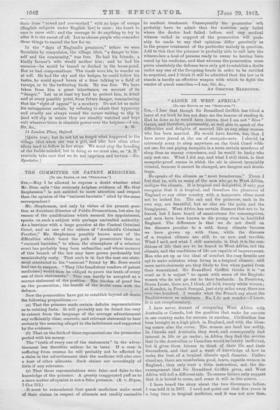THE COMMITTEE ON PATENT MEDICINES.
[To TEE EDITOR. OF THE "S1'ECTATOR.1
Sta,—May I be allowed to express a doubt whether what Mr. .Dore calls "the curiously helpless evidence of Mr. Guy Stephenson" is not entitled to more attention and respect than the opinion of the "eminent barrister" cited by the same correspondent?
Mr. Stephenson, not only by virtue of his present posi- tion as Assistant Director of Public Prosecutions, but also by reason of the qualifications which secured his appointment., speaks on such a subject with perhaps unrivalled authority. As a barrister with a large practice at the Central Criminal Court, and as one of the editors of " Archbold's Criminal Practice," Mr. Stephenson possibly knows more of the difficulties which beset the path of prosecutors than an
■ ‘ eminent barrister," to whom the atmosphere of a criminal court has probably long been unfamiliar, and whose memory of this branch of the law may have grown pardonably but unmistakably rusty. That such is in fact the case one state- ment attributed to his " eminent " friend by Mr. Dore would lead one to suspect. "They [the fraudulent vendors of patent medieines3 would then be obliged to prove the truth of every one of their statements." Thie can hardly be accepted as a correct statement of the position. The burden of proof lies on the prosecution ; the benefit of the doubt rests with the defence.
Now the prosecution' have got to establish beyond all doubt the following propositions :— (a) That the prisoner made certain definite representations as to existing facts. It will probably not be found too easy to extract from the language of the average advertisement any sufficiently clear; concrete, and relevant statement to bear certainly the meaning alleged in the indictment and supported by the evidence.
(b) That on the faith of these representations the prosecutor parted with his money.
The "truth of every one of the statements" in the adver- tisement 'can therefore seldom be in issue. If a man is suffering from eczema he will probably not be affected by a claim in the advertisement that the medicine will also cure a host of other ailments. Such claims are accordingly of little if any relevance.
(c) That these representations were false, and false to the knowledge of the prisoner. .A. grossly exaggerated puff as to a. mere matter of opinion is not a false pretence. (R. v. Bryan, 7 Cox 312.)
It must be remembered that quack medicines make most of .their claims in .respect of ailments not readily amenable to medical treatment. Consequently the prosecutor wilt probably have to admit that the nostrum only failed where the doctor had failed before, and any medical witness called in support of the prosecution will prob- ably be made to say that opinions differ genuinely as to the proper treatment of the particular malady in question. Add to this that the prisoner is probably able to call into the witness-box a host of persons ready to swear to having been cured by his medicine, and that whereas the prosecution must prove absolutely the defence have only got to establish a doubt under any one of the foregoing heads in order to be entitled to acquittal, and I think it will be admitted that the law as it stands is hardly an effective weapon with which to fight the vendor of quack remedies.—I am, Sir, &c., AN OBSCURE BARRISTER.






















































 Previous page
Previous page